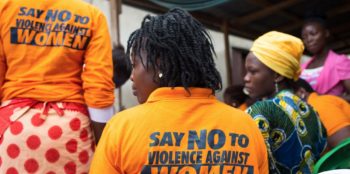
McLeod Group blog, April 23, 2018
Outdated regulations at the Canada Revenue Agency and Treasury Board are undermining Global Affairs Canada’s goal of supporting local women’s organizations in developing countries, but easing the restrictions isn’t a government priority. What should Minister of International Development Marie-Claude Bibeau do about it?
In announcing its new Feminist International Assistance Policy (FIAP), Global Affairs Canada (GAC) said it will “advance a more flexible, innovative and integrated approach toward achieving gender equality”. A key part of the FIAP is the Women’s Voice and Leadership Fund (WVLF), with a budget of $150 million over five years, whose purpose is to “respond to the needs of local women’s organizations in developing countries that are working to advance the rights of women and girls”. This is positive, especially because research has demonstrated that although the work of women’s rights organizations can lead to changes that support women’s empowerment, Southern women’s organizations are seriously underfunded.
That’s the big picture. At the programmatic level, a key question is how the money flows from this policy commitment to the local women’s organizations. In the case of the WVLF, the vast majority of the money will flow through international (Northern) NGOs and multilateral organizations to local Southern women’s organizations (see our previous blog here). In only one case will it go directly to a local women’s organization. To a large extent, this is typical of aid-related relationships between Northern and Southern NGOs for the last 50 years. It means that the money, direction, and control rest with the Northern organizations. This asymmetry feeds into tensions at the global level between Northern and Southern NGOs around such issues as who receives most of the money from global donors, who sets programmatic priorities and who shapes the global policy advocacy agenda.
In Canada, the Canada Revenue Agency (CRA) regulates the international programming (or “foreign activities” as they are called by CRA) of Canadian NGOs. Canadian charities that use an intermediary, i.e., a southern NGO, to carry out their programs must direct and control the use of their resources. According to CRA regulations, “The [Canadian] charity must be the body that makes decisions and sets parameters on significant issues related to the activity on an ongoing basis”.
These “direct and control” regulations, CRA definitions of charitable activities, and limitations on the political activity of Canadian NGOs, undermine the creation of equitable partnerships between Southern and Canadian NGOs. Such partnerships are crucial to supporting Southern organizations in defining and implementing their own programs, including policy advocacy. The Canadian Council for International Co-operation argued in its 2016 submission to CRA that “direction and control” requirements squarely contradict international best practices in global poverty reduction. In addition, Treasury Board requirements on monitoring and reporting on overseas grants further limit the space for equal partnerships.
One of the Liberals’ election promises was that they would modernize the rules governing the charitable and not-for-profit sectors. A key issue is the regulation of political activities of charities. In 2016, they appointed a panel to look at this matter. The panel’s report, released in March 2017, recommended allowing charities to fully engage in non-partisan public policy dialogue and development, provided that the activities are subordinate to and further their charitable purposes. It also proposed updating the list of charitable purposes to reflect current social and environmental issues and approaches.
There has been no further progress on these issues over the past year. In fact, a group of environmental charities left a meeting with Finance Minister Bill Morneau last week with the sense that the government has little commitment to and no timeline for the promised easing of restrictions on political activity.
Many Canadian NGOs and their Southern partners have been serious about developing equal partnerships and creative in using the space they have. It would be much easier, however, if there were regulations that actually facilitated the implementation of well-established international norms of local ownership and control – rather than threatening Canadian NGOs with penalties if they do not retain control.
GAC’s aid policy states that the government wants a more flexible, innovative and integrated approach. We have heard that the International Development Minister Marie-Claude Bibeau is committed to ensuring a greater role for Southern organizations as the Women’s Voice and Leadership Fund unfolds. To do so, GAC will have to make a serious effort to identify and support direct funding to Southern organizations to act as intermediaries and manage national and regional programs that provide funding and support to local Southern women’s organizations to carry out on-the-ground programs.
The Minister will also need to work collaboratively with CRA, the Departments of Finance and Justice as well as Treasury Board to develop regulations that support more effective overseas programming. This kind of interdepartmental cooperation will be challenging, but necessary, if GAC really wants a more effective approach to enhancing gender equality.
